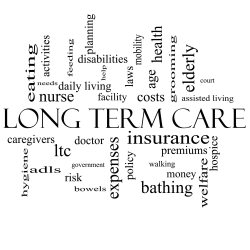3 Questions To Ask About Your Long-Term Care Needs
If you’re like many Americans, you might be worried about how to prepare for your own or your loved ones’ long-term healthcare needs. In previous generations, elderly parents and grandparents could count on moving in with relatives when they became unable to live alone. However, today’s family dynamics have changed and many Americans are reluctant to burden their families with caregiving duties.
Long-term care can be defined as the services needed to support someone who is elderly, chronically ill, or disabled, and unable to care for themselves for a long period of time. Most long-term care is focused on helping people with daily activities like dressing, bathing, cooking, and using the bathroom.[1]
The associated costs can be alarming: According to the Genworth Financial Cost of Care Survey in 2015, the average national long-term care expenses in 2015 are $45,760/year for a Home Health Aide, $43,200/year for an Assisted Living Facility and $80,300/year for a Nursing Home Semi-Private Room. These are just averages, and many areas in the United States are much higher. One 2010 study projected that healthy 65-year-old couples could expect to spend $260,000 on healthcare in their remaining years.[2]
Though we cannot fully cover a topic as complex as long-term care in a single article, we’ve presented several questions that can help you begin the conversation about your future needs.
What are the costs of long-term care?
While most Americans can rely on Medicare for routine medical issues and hospital procedures after age 65, there are limits to what Medicare will cover. For example, Medicare does not cover personal care at home (unless you are receiving nursing care), services to help you stay at home, or long-term nursing home or custodial care.[3] Since Medicaid usually only kicks in when you have depleted your life savings, you will likely have to pay out of pocket for any home-based, nursing home, or assisted living care that you might need.[4]
The cost of care can vary dramatically by state and city. For example, the annual cost of a semi-private room in a Florida nursing home has a median price of $87,600 in 2015. The same type of room in Alabama costs $69,715.[5] Doing some research in your area can help you develop better estimates for your future needs.
What financial resources do you have?
Depending on your personal financial situation, there are a number of options available to help you prepare for future long-term care expenses. For example, if you have sufficient wealth, you might be able to self-insure and cover long-term care costs without threatening your (or your spouse’s) lifestyle. If you are a disciplined saver, you might consider setting aside money each year to cover healthcare needs. Long- Term Care insurance is also an option that could make financial sense. One of the main reasons that couples purchase long-term care policies is to protect a healthy spouse if the other requires expensive care or needs to go into a nursing home.
Bottom line: Healthcare planning is complex and there are many factors in your personal situation to consider. Long-term Care insurance policies contain exclusions, limitations, reductions of benefits, and terms for keeping them in force. We strongly recommend working with a professional who can help you evaluate your options and determine the best strategy for your needs.
What’s your personal and family health history?
There’s no way to know whether you’ll actually need long-term care until you do. However, your current health and lifestyle can help you understand how likely you are to need care later in life. You can also take a look at how your parents, grandparents, and other relatives aged to give you insight into what might happen in your own life. Since your age and health history will affect the cost of Long-term care insurance premiums, it’s essential to start thinking about your needs as soon as possible.
How We Can Help
With Americans living longer, more independent lives, healthcare has become an increasingly important matter. Long-term care issues are very complex and professional advice can help you prepare for future needs, remain independent as long as possible, and reduce the risk of outliving your nest egg.
[1] https://longtermcare.gov/the-basics/what-is-long-term-care/
[2] In 2009 dollars https://money.usnews.com/money/blogs/the-best-life/2010/05/12/good-health-raises-lifetime-care-costs
[3] https://www.medicare.gov/coverage/long-term-care.html
[4] https://www.aarp.org/health/medicare-insurance/info-05-2011/what-medicare-doesnt-cover.html
[5] https://www.genworth.com/corporate/about-genworth/industry-expertise/cost-of-care.html
Bravias Financial is an independent wealth management firm. Investment Advisory Services offered through AlphaStar Capital Management, LLC., a SEC Registered Investment Advisor. AlphaStar Capital Management LLC and Bravias Financial are independent entities. Insurance products and services are offered through individually licensed and appointed agents in various jurisdictions. This article is for informational purposes only and is in no way a solicitation or offer to sell securities, investment advisory services or insurance products. These are the views of Platinum Advisor Marketing Strategies, LLC, and not necessarily those of the named representative, Broker dealer or Investment Advisor, and should not be construed as investment advice. Neither the named representative nor the named Broker dealer or Investment Advisor gives tax or legal advice. All information is believed to be from reliable sources; however, we make no representation as to its completeness or accuracy. Please consult your financial advisor for further information. We have not independently verified the information available through the following links. The links are provided to you as a matter of interest. We make no claim as to their accuracy or reliability. Opinions expressed are subject to change without notice and are not intended as investment advice or to predict future performance.

